Fans have sent in stories of their memories of the Music Circus. Hundreds of thousands of people over the years enjoyed performances at the Music Circus. To some of them the experience left an indelible memory.
Those fortunate enough to work behind the scenes and on stage at the Music Circus had the opportunity to see and hear all that occurred. Enjoy their stories, tales and "inside perspectives."
Stories and Memories from Fans
From: gbrickson
Date: September 23, 2002
One year before I discovered any herbs to make the music even better, I had become a Vanilla Fudge fan. I went to see them perform in concert at St. John Terrell's Music Circus in Lambertville, New Jersey, about 30 minutes north of New Hope, Pennsylvania. The concert was great. I guess no one told the band, though, that the stage revolved, and the standard procedure was that when a musical group appeared, the stage would move 90 degrees after every third song. When the wires were stretched too taught, after the sixth number, the plug to the Leslie speaker was pulled out. We had an unplanned ten minute intermission...
Source: www.vanillafudge.com/
From: Dave Kukor
Date: June 27, 2020
Toward the end of the Magic on Music Mountain video, Vinny Martell of Vanilla Fudge talked about performing there. As I watched I wondered if he'd tell the story of what happened the night I saw them.
They were coming to the end of "Keep Me Hangin' On," the part where there's a huge crescendo then just the organ playing slow, single notes. At that very moment the power went out. Not missing a beat, Marc Stein whistled the notes he would have played on the organ had the power not gone off. People went crazy applauding!!
From: Greg Otto
Date: April 20, 2006
I remember that Gary Puckett and the Union Gap had scheduled a concert at the Music Circus sometime in the Summer of 1968. Somehow, they had also scheduled a concert at Central Park in New York on the same day and pretty close to the same time. I recall that there was an announcement that the band would be late and then a while later the sound of helicopters could be heard outside the tent. And that was how they arrived, literally out of the air. Anyway, the show went on and was quite enjoyable, with the guys attired in those classic Civil War looking uniforms.
From: Kenneth W. Host
Date: November 24, 2006
I appreciate your dedication to this web site. On my birthday June 24, 1968, I attended a Fifth Dimension concert at the Music Circus. The weather was perfect and with the rotating stage, we all got a great view. After the concert, one of my Rutgers classmates went "backstage" with me and introduced himself to a then unmarried Marilyn McCoo. I remember him arranging a date with her, but I don't know if it ever occurred. The memories are great and it's nice to see that you have preserved them for us.
Thank you, Kenneth W. Host
From: Devan
Date: August 6, 2009
Back in the 1960's, I use so spend my summers, along with my younger brother and sister, at our beloved Aunt Lil's house, right on the highway leading to the Music Circus. She had a wonderful front porch, complete with awnings, and rocking chairs, and we use to sit on that porch, and just watch in awe, of the line of traffic that use to pass by, on their way to see some fabulous show at the Music Circus.
There were actual evenings, when the traffic would be at a standstill, and I would wish that we too could go to a show. Back then, what music! What talent! The Young Rascals, The Four Seasons, The Cowsills, The Association, Jay Black and the Americans, Wayne Newton, Liberace, wow!! We would just be so excited on the fact of who was going to be there any given night!!! That place remains a special memory of my childhood, back when life was so innocent and easy....
I finally got to see some of the artists who had performed there over the years, just saw Felix Cavaliere of the Young Rascals last evening... So, the memories of the music from way back then,remains alive, and preserved, in a special place...
It was a treat to run across this website. I have only one memory of the Music Circus, but it was a very enjoyable one. In July or August of 1970, my brother and I attended a Sunday concert performed by "Procol Harum," the British art rock group immortalized by their recording "A Whiter Shade of Pale" in 1967. They were my favorite group at the time and it was my first opportunity to hear them perform live in concert. The stage revolved during the performance, sometimes as a song progressed and other times it was rotated to a set position for the performance of a particular song. The band played "A Salty Dog," "Whaling Stories," "Whiskey Train" and many other selections from their first four albums ("Home," the fourth, was about to be released that fall). The group had already undergone their first major personnel change, with organist Matthew Fisher and bass guitarist David Knights departing, both replaced by multi-instrumentalist and former Paramounts' band mate Chris Copping, joining pianist/vocalist Gary Brooker, guitarist Robin Trower, and drummer Barrie (BJ) Wilson. I went on to see the band perform live six more times in the next two and a half years, but never in as intimate a setting.
Keep up the great work in maintaining this site and I wish I could provide you with more detail and additional dates and performances, but this was my only foray to the Music Circus.
From: Rich Balin
Date: June 27, 2012
While gathering alumni for our facebook page, www.facebook.com/montessorichildrensvillage, we are assembling our old photos and came across this one....every summer we would attend the Circus...this photo is from 1949 and with Susan Foster and Wilbur Evans in the background, I believe it could have come from "The Merry Widow"....in '50 I remember attending "Anything Goes"....the Music Circus led my sister Ina Balin and Me to careers in the Theatre and films....
All the best, Rich Balin
Montessoris at the Music Circus 1949
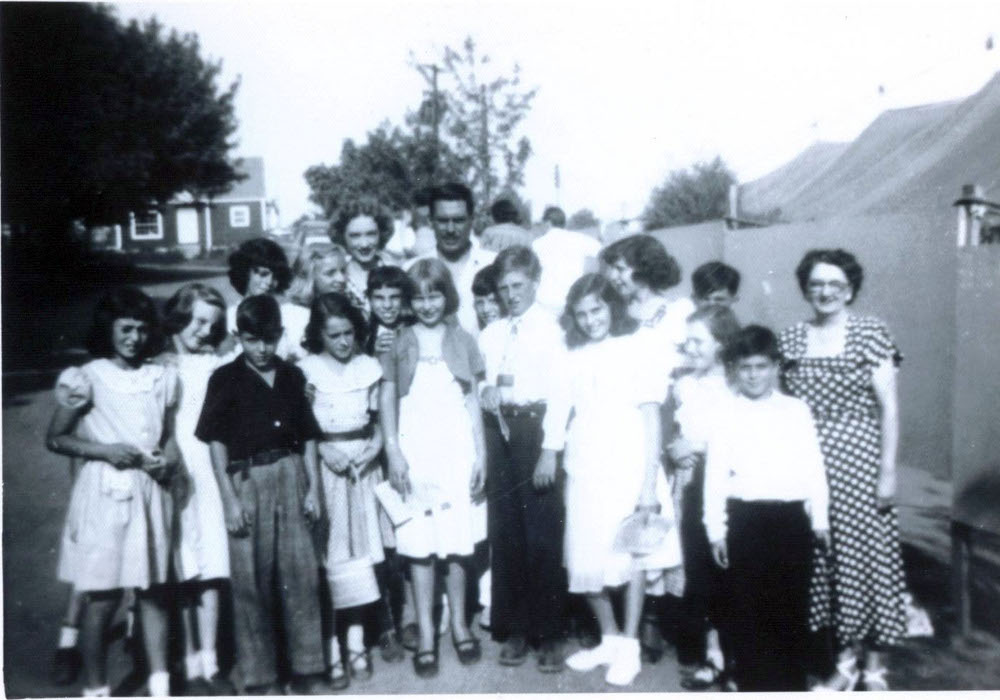
Montessoris at the Music Circus 1950
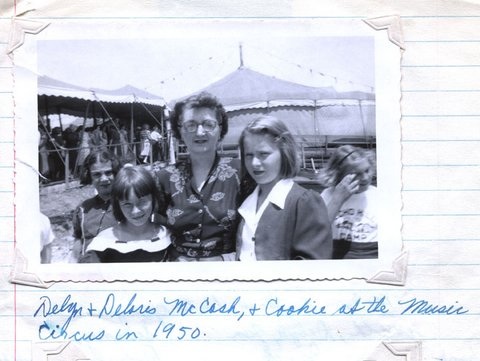
Stories, Tales, and Memories from Staff and Performers.
I understand the passion behind what you are doing—or maybe I should call it the romance. I worked at the circus for many years. When the romance of the stage gets in your blood, it never leaves.
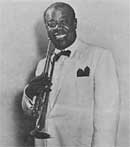
I did many jobs during those summer months. There was ushering (by the end of a two week run you could stand-in for anybody), concession, parking lot and "the Chicks." You might not remember the Chicks. I think we only lasted one season. There were three of us chosen to alternate in the position. It was Linda Nanni, Susan Lambert and moi. It would be our job to don ridiculous outfits and serve fried chicken dinners (provided through Buddy Williams) to the performers. It was deplorable but afforded lots of free time.
It was August 17, 1964, I was the Chick and Louis Armstrong was performing. I had free time. I must have circled that pathway around the tent 300 times just hoping to get a close up glance of Louis. By the 301st rotation, one of his handlers must have caught on because he stepped out of the dressing area and invited me it. I probably could have been fired from this high paying job—I worked at least 30 hours each week and took home $19 and change—but a personal audience with this legend would have been way more than worth it.
I sat for his warm-up medley, some conversation and a good-bye hug. I don't think I spoke for three days. Forty years later I still walk on a cloud when I think of that day.
I have often wondered if Mr. Terrell was aware of the gift of education, growth and culture that he provided so many poor, small town kids who otherwise would never have been exposed to the arts in such a grand way. My life is definitely bigger because of the experience.
St. John (pronounced "Sinjin" in spite of the spelling) was born George Eccles and changed his name fairly late in life. Program credits for his early Broadway appearances still listed "George Eccles."
St. John's mother changed her name to fit her son's. Rita Terrell ran a cosmetics business on Bleeker Street in New York at an address (which eludes me at the moment) sometimes used St. John himself. The inside man at Rita Terrell cosmetics was a fellow manned Frank Graf who occasionally worked at Lambertville as well. Frank had an old bath tub and a canoe paddle that he used to create the Terrell cosmetic line upstairs from the store. The specialty product was called "Frangipani Toilet Water."
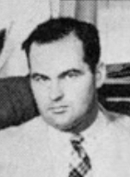
I was a political science major at Harvard (running both its radio station and dramatic club) when I was introduced to Cornelius P. Cotter (Neil) in the spring of 1951. He was Terrell's first general manager as I recall and at age 26 recruited me to be his secretary for the 1951 summer season. (He needed a male secretary because it was then illegal to work women more than 8 hours a day or 40 hours a week, and my typical day began with picking up the mail at the post office around 8:30 A.M. and finished with my making a night deposit at the bank around 1:00 A.M.
The tent had 2200 regular seats, but Lou Marini (our boss canvasman and concession manager) often added up to 250 additional folding chairs to accommodate standing room only crowds. At one point, we sold out 49 consecutive performances (including Saturday Matinees) and the money ran out all over the floor. I recall weeks in which we netted over $50,000—and that was a ton of money in those days when chorus kids were paid $30 a week and I started for the princely sum of $50.
Except for the principals that were billeted at the Lambertville House, most of the company found rooms in local homes - mine cost $8 a week and was just down the street from Hennessy and McGuire's greasy spoon where dinner could be had for 65 cents. Harriet Reading—a long time Lambertville resident—organized the housing and also functioned as wrangler for the 14 and 15 year old high school girls who were our usherettes.
Harry Mulhern was our box office treasurer abetted by the Wells sisters, Anita and Joan. Harry was a stalwart. Invaluable. In the winter he was box office treasurer of the Shubert Theater in Philadelphia.
Oscar Kosarin, our musical director, went on to fame (and I hope fortune) on Broadway. Choral director and pit pianist was Irvine Schlein. The pit orchestra typically comprised 8 sides plus Oscar (violin, viola, cello, bass, piano, organ, percussion and a wild card such as harp, oboe, flute or whatever was most appropriate to the show).
George Crook manhandled a Hammond instrument in an uncanny way that made it sound like a whole brass and woodwind ensemble put together. In the winter, George was live studio organist for WBBM in Chicago whence originated most of the radio soap operas in their golden years. Everything was broadcast live in those days, and George ad libbed virtually all of the music.
Three special events stand out in my memory. We closed one of the seasons I was there (either '51 or '52) with "Carmen Jones", and it was great. We closed the other season with "Jose Greco and his Troupe" of flamenco musicians and dancer starring Jose's pregnant (but not too pregnant) wife, Nila Ampara. Jose had never worked in the round before, and lamented that he couldn't always work that way.
Oscar Hammerstein lived right across the river in Bucks County and he and his wife were regulars at the Music Circus. Oscar and Dick Rodgers had laid an egg on Broadway with a show called "Allegro," and Oscar cut a deal with St. John for us to do a new version with a completely re-written second act. Unfortunately, it was still a turkey. Like many of us, Oscar et us enjoyed eating at Johnny Francis' Canal House in New Hope, and Mrs. H was renowned for making a pecan pie to die for. Johnny tried to get the recipe but to no avail, but Mrs. H. did frequently bake her famous pies for Johnny to serve his patrons.
Our corporate attorney was William Kunstler who later became notorious for some of the clients he defended. Our accountants were the firm of Lutz and Carr out of New York. Their girl Friday was a lady named Margaret Osten who was the precursor to the personal computer. Margaret could unerringly add a column of seven-digit numbers in a single pass, apparently just scanning the list. Amazing!
Our press agent was Max Eisen from whom I learned most of what I ever knew about publicity, promotion, and public relations. We shared an office, and the experience was unforgettable. In his spare time, Max was an Olympic class speed walker. He went on to practice his art with considerable success on Broadway, eventually married, and had two daughters as I recall. Our National Press was handled by Arthur Cantor who went on to become a Broadway producer.
Our Stage Director was Robert (Bobby) Jarvis who interpolated mountains of schtick left over from vaudeville days into our productions and thereby made even the oldest of the old war horses come back to life.
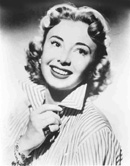
Our most memorable star was Audrey Meadows who did "High Button Shoes" in company of Tim Herbert and Don Saxon. Audrey was most memorable, however, not for her performance but for her vocalize. She would warm up at top voice singing "S -H - I - T - F -U - C -K." Marilyn Day who did "Finian's Rainbow" ran Audrey a close second. Her warm up consisted of a single, blood-curdling shriek.
Our Stage Manager was Arthur Gerold who went on to first manage and then own a costume business in Philadelphia—I think maybe he eventually consolidated the business by acquiring Eaves Co. of New York. Our wardrobe mistress, whose name eludes me at the moment, was a genius at the sewing machine and later went to Hollywood where she got costuming credit for a number of shows.
I remember only a few of the members of the resident company. Juveniles and ingenues were typically imported. Rowan Tudor played most of the mature male roles. Among the singers was Hal Warren who, with his wife (Norma Dickey, an encyclopedia editor), remained good friends for many years. Members of the dancing chorus included: Max Nivelon, Teddy Kokis, Marion Germaine, Roberta Onigman, Marie Kolin, Madeline Artieres (whose father was concert master of the Boston Symphony) and Sandy Stein whom I frequently saw for dinner and who (I later learned) frequently saw St. John after the show. The last I heard of her, she had moved back to Coral Gables whence she originated and had changed her name to Stevens.
Larry Hagman played a minor juvenile role in the first production I ever saw at the Music Circus in 1951, "The Desert Song."
St. John had previously been in business with two partners, Aldrich and Myers, one of whom died unexpectedly. The partnership ended but the friendship persisted. The departed partner ran music circuses at Hyannis and Cohasset on Cape Cod. At the high water mark of the Music Circus era, there were operations in Florida (St. Petersburg and maybe another), the Dallas State Fair, and elsewhere. The genre was widely copied and emulated, but Lambertville was uniquely successful. Its location was perfect (the huge, affluent, north Philadelphia, market within easy driving distance, and accessible from New York itself) and its timing just right. In the summer of 1956 while on active duty with the Army (having been drafted), I moonlighted as business manager of The Melody Circus Theatre in Milwaukee. Both its location and its timing were wrong, and it failed in mid season.
One of my major responsibilities was to baby sit Messrs. Lewis and Young who bought a Music Circus franchise and set up shop (with a good deal of help at then considerable expense over the long distance telephone) in Sacramento, California. The successor to that operation, on the very same site, continues in business today, more than half a century later.
A couple of weeks into my employment at Lambertville, my title was changed from "secretary" to "assistant to the general manager," and a few weeks later, the "to the" was dropped. The following season (summer of 1952), I returned as general manager in fact although the title was held by Arthur Gerold who actually functioned as assistant director.
I left the company a few weeks before the end of the 1952 season in order to enroll in the Harvard Business School with the intention of making a career in theatrical management. When I graduated, David Marshall Holtzman offered me the position of general manager for all of the Aldrich operations on the Cape (two music circuses and two playhouses).
I turned that opportunity down because it provided only five months of employment, and I was doubtful that I could find theatrical employment in New York during the winter inasmuch as I was neither Jewish nor Catholic and therefore, realistically, an outsider. And I really didn't relish the idea of joining all the seasonally employable chorus boys and girls clerking at Altman's department store and/or singing paid gigs in churches on Sunday. I recommended a sometime colleague, Herman Krawitz, to David. He took the job and ultimately became general manager of the Metropolitan Opera.
Well, there's a start with some of the anecdotal trivia from the 1951 and 1952 seasons. I'll send you more—and hopefully something more substantial—as time goes on. I'm glad you're doing this. It's a page in theatrical history that shouldn't be lost.
Starting as the drummer.
I remember my "audition" to play in the pit orchestra in 1958. I was a percussionist/set drummer and had been playing professionally since the age of 15 and was then 27. My regular job was for the Township of Hamilton in Mercer County, NJ as an instrumental and vocal teacher. From the beginning, the drummers in the Music Circus orchestra always came from NYC with the out-of-town conductor of each show. Joe Higham, the musicians "contractor" arranged for me to audition for the conductor of the first show that season, "The Most Happy Fella".
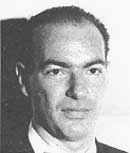
I appeared well ahead of time, set up my drum set, vibes, timpani, bells, and waited. The conductor arrived, of course, skeptical that a "local musician" could "cut" the difficult part. He handed me the percussion part and said, "take five minutes and look over the overture, then I'll conduct as if the whole orchestra is here and you play." I nailed it. The job was mine!
Becoming Conductor and Musical Director.
While playing in the pit orchestra at the "Circus" I became aware of the fine choreographic talents of Edward Earle. They were remarkably evident in our 1960 production of West Side Story." I was teaching at Rider College (now Rider University) in Lawrenceville, NJ and that winter we were scheduling a production of that show. I touted Ed's abilities to the producer/director, Lee Yopp, who asked Ed to choreograph our production. It was eminently successful and Ed and I worked closely together to make it work in the Rider Gymnasium. (There really WAS a "Dance at the Gymnasium" in THAT production!) Ed also choreographed another show for us so he saw my work again as musical director/conductor.
That next summer, part way into the season, the director and Ed were not pleased with the musical director. I knew nothing about this but was told later that a meeting ensued with Sinjin at which it was determined they would let this conductor go. However, all were wondering where they would find a proper replacement with the busy summer stock season well under way. Sinjin was going to call some NYC agents he knew to get some recommendations, but he knew that that route was going to be costly. Ed Earle came to the rescue and spoke up saying, "You have a very competent conductor right in the pit." When asked who he meant, he said, "Your drummer Art Frank. I have worked with him and he can do the job." In chorus (I was told later) they said in disbelief, "The drummer? He's a conductor???" It was hard for them to believe that a local yokel (and a DRUMMER no less) could handle that very pressured responsible position. However, Ed prevailed. After the Sunday night closing performance of "High Button Shoes," they called me into the office and asked me if I thought I could handle the assignment. Opportunity only knocks once, (I believe I was 29 or 30 yrs old at the time) and I gulped and said, "Yes Mr Terrell, I can do it!" They handed me the score to "Destry Rides Again," and told me to report the NEXT MORNING at 9 A.M. to the last full day of rehearsals before the Tuesday night opening. I had never seen that show OR heard the music nor did I personally know anyone in the cast except Ed and Frank Piper. YIKES!
I stayed up all night learning the score and examining all the orchestra books. When I came to rehearsal it was with a glowering resident company who had just lost their regular conductor. I had HIS assistant conductor as my pianist (who immediately gave two weeks notice) and the lead in the show was the brilliant monologist, Jean Shepherd, who was a well-known radio star but a completely undisciplined, inexperienced theatrical performer. SOMEHOW, we pulled it off and made it through opening night. Of course, the next morning at 10 A.M. (I talk about the typical work week below) we immediately started rehearsing for the next show, "Wish You Were Here.". At least I knew THAT show very well because I had conducted and directed a production of it just a few years before that. The rest is history and I remained the conductor there until the end of the full seasons of musicals several years later.
Working with the orchestra.
The orchestra members were usually given their parts for the upcoming show about two days before (Sunday evening) opening night (Tuesday evening. The reason I had to keep the books from them so late was because I needed to enter the multiple "cuts" we made during the rehearsal week to accommodate the vicissitudes of the theatre-in-the-round possibilities and restrictions and/or the special needs of the lead singers, etc.
Tuesday morning the orchestra came in at 9 A.M. for a four hour rehearsal. At that rehearsal the principal singers (leads) often came, at about 11 A.M. to get their only chance to try their numbers with the orchestra at least once. They stood on the stage above me and got to sing as I rehearsed the orchestra which was my prime focus as it was my only time with them and we "opened" that evening at 8 PM.
The hardest thing was fixing and adjusting the orchestral arrangements so that it did not sound too sparse with only 9 players compared to the usual Broadway 24 piece pit group for which the "books" were written. Occasionally, ("West Side Story" and "Music Man" come to mind) there were orchestrations available for reduced numbers of players.
We often had to transpose whole sections of numbers or whole numbers for certain performers. My players could basically do that at sight if the transposition was within a "third" away.
They were terrific players and loved doing the shows and, of course, it was the best "gig" around running +/- 16 weeks each summer!
Playing in the orchestra were:
Richard Averre - piano/Assistant Musical Director
Joe Higham - violin
Otto Helbig - violin
Robert Reikosky - bass
Domenick Arcuri - Fl./clar./A.sax
Bill Humenay - clar./T.sax
Joe Scannella - trpt.
Jack Horner - trb.
Art Giedlin - drums
Yes, the same musicians came back year after year. There were replacements sometimes; including Jerry Nowak, now a professor at Bucks County Community College, Bill Holcombe, composer/arranger/publisher of some renown, Gil Toth, trombone, and others whose names escape me at the moment but the core group named above were the year-after-year regulars.
Back in 1966 (or '67) I performed at the Music Circus in a "Battle of the Bands" that ran all summer long. I was the singer with a group called "The Prophets," from Fredericksburg,VA. We wore Roman togas and sandals. I remember Bruce Morrow (Cousin Brucey), James A. Michener, and Phil Spector were the judges. Mr. Michener even mentioned us in a Readers' Digest article covering the event entitled "Don't Knock The Rock." I believe we took fourth place in the competition of over 900 bands.
I remember the event being filmed and was wondering if you know where I might obtain a copy of the footage. It would be wonderful to see our performance there since video recorders were a thing of the future.
Any assistance you can give me would be greatly appreciated. I am still in the entertainment industry in Nashville,TN and performing at St. John Terrell's Music Circus was a highlight in my life.
Steve Jarrell, Nashville, TN
Added February 4, 2010.
A few years ago I wrote to you about performing in the Battle of the Bands in the summer of 1966. I ran across some old 8mm footage of the event that I transferred and would like to share with those that might remember. Keep in mine how filming was with the first consumer movie cameras of the day. But at least, it's documented. There was a professional film crew filming the event. Does anybody know where the footage might have ended up?
Enjoy. Steve Jarrell, The Prophets
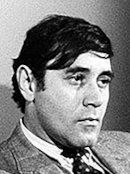
Elaine Stritch played Anna!! in the 1965 production of "The King and I." I recall that Art Frank had to change keys for everything she sang as her range was totally different from any other Anna heard before (or since, I guess) on the professional stage. As it turned out, she worked hard, was a wonderful Anna, and brought her solid acting strength to the role.
Art Frank, Musical Director, confirms:
Yes, the Elaine Stritch episode was true. We changed keys for performers often. My musicians were VERY adept at that. Most could do it reasonably well at sight without writing out the transposition.
I'm not quite sure exactly when Elsie Scheetz joined the Music Circus staff, but I think it was around the 1950 time frame. I know that Harriet Reading was the secretary during and between the 1950-52 seasons and probably before that, so it could have been in 1948-1949. She and Elsie were very close friends, belonging to several clubs and organizations in Lambertville. I believe that it was Harriett who talked Elsie into handling the mass mailings during those first couple of years and then persuaded her to join the staff. When Harriett fell ill and could no longer work at the Music Circus, Elsie took over for her.
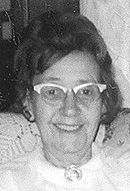
Initially, Elsie was hired by Mr. Terrell as his personal secretary, but as the years went by, she became so entwined in many parts of the business that she held positions at various times as Administrative Assistant and Office Manager, responsible for the entire office administration reporting to the General Manager, but always working with Mr Terrell directly. Elsie was a very hard worker, and behind the scenes people who had contact with her said that she was the backbone of the organization. Elsie was a very pleasant, but no-nonsense, roll-up-your sleeves-and-get-the-job-done-whatever-it takes person. She knew how to make things happen and get things done and was described by many of the people she worked with as being the "glue that held the place together"—an indispensable, wonderful woman. Whatever the case, she took her work seriously and certainly was dedicated. Elsie was devoted to Mr. Terrell and shared (or believed in) his dream and vision for the Music Circus. They had a special business bond between them and were totally committed to each other and their work. They shared a mutual respect and admiration for each other. Elsie worked for Mr. Terrell for nearly 20 years; not only did she know where everything was, but she knew most aspects of the business.
One of Elsie's many talents was her superior typing ability, unique in that she rarely took shorthand, but rather, typed as Mr. Terrell dictated. Mr. Terrell was amazed at the speed at which she could type. People who knew Elsie have remarked to this day that they have never seen anyone type as fast as she could. In addition to her superb typing skills, Elsie also prepared and maintained the contracts for some or all the actors, management, and other contracted personnel. She assisted in the hiring process, the payroll, and show scheduling. She also arranged accommodations and transportation for the summer cast and the shows' stars. The chorus and dancers were usually hired for the entire summer. Elsie helped find boarding homes for them in Lambertville and New Hope (PA). Many of the stars stayed at the Canal House in New Hope.
The Music Circus purchased a red van that had the "musical clown" logo on the side. One of the many uses of this van was transportation of the actors, dancers, and chorus to and from the rehearsals and shows. The driver would pick up anyone requiring transportation at various locations in Lambertville and New Hope.
Although the tent was taken down sometime during the fall, considerable activity still occurred during this time, continuing throughout the winter and spring. In the early years when the Music Circus was located on Music Mountain (as it became known), most of the buildings were closed in the winter. Elsie had an area in her home that she fondly claimed as her "winter office." She took most of the files and important documents home during the off-season, maintained communication with Mr. Terrell and the General Manager and worked from her home. Later, when the Music Circus moved to its new location, the "A-Frame" office was built on Music Circus property and subsequently was used during much the off-season. (Although, during the colder and snowier months, work was still done from the warmth of their homes.)
Throughout the fall and winter, Elsie, Mr. Terrell, and the General Manager worked on the next season's schedule, negotiations, preparation of contracts, and hiring of the cast and staff. During this time they also worked on rewriting and typing the scripts for the plays. The scripts had to be revamped because it was a "theater in the round" and therefore many of the stage directions had to be altered. For instance, there was no "enter stage left," "exit stage right" as on a regular stage. There were different aisles through which the actors would enter and exit. By early spring the schedules were finalized and sent out to the printers. Posters, tickets and, yes, the mass mailing needed to be produced for the coming season. During this time Elsie also handled preparations for Mr. Terrell's annual re-enactment of George Washington's famous Revolutionary War crossing of the Delaware River.
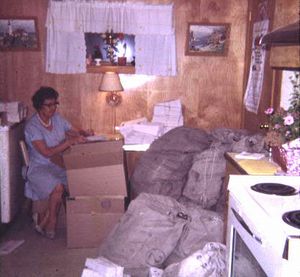
Photo Courtesy of Bob Sheetz
Preparation at Elsie's house began for the annual mass mailing. Furniture was pushed aside, card tables and chairs were set up and the family was prepared for the next several weeks of having anywhere from eight to twelve people come into their home to type and stuff envelopes. It was sometime around April 1st I believe, when boxes upon boxes of envelopes and schedules arrived at Elsie's house. Stacks and stacks of boxes were stored in the dining room and mail bags were stacked all over the living room.
The mailings in those days were a 100% manual operation, unlike today with computerized mailing lists and postage machines. In the beginning all envelopes were typed from lists. Elsie would set up eight or so typewriters on the dining room table and people would come in at various times during the day, evening, and night to work. Some stuffed schedules into envelopes, others typed addresses or affixed labels to the envelopes, and still others sealed the envelopes. They were paid one penny for typing an address and one penny for stuffing an envelope. This process took anywhere from four to seven weeks.
Later (in the 1960's), an outside organization produced the labels from lists supplied by the Music Circus, cutting down some of the time required; however, the stuffing, sealing, sorting and mailing still took place at Elsie's house. Maintenance of the mailing list was a major feat in those pre-computer times. Because people could request having their name added to or removed from the mailing list at anytime, the list was continually updated throughout the year, although only one mailing per year took place. The names and addresses on any of the envelopes that were returned were removed from the list, necessitating endless typing and retyping of thousands upon thousands of names and addresses. Most of these addresses were in the New Jersey, New York, and Pennsylvania areas with a few clusters in Connecticut, Delaware, and Maryland. Of course, there were other addresses scattered throughout the country.
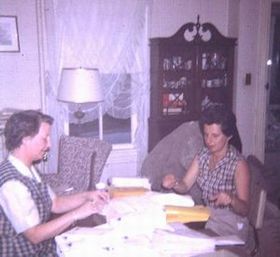
Photo Courtesy of Bob Sheetz
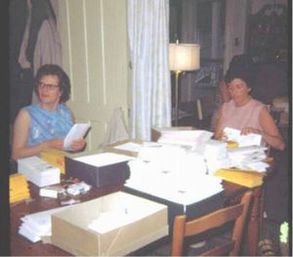
Photo Courtesy of Bob Sheetz
Among her other responsibilities, Elsie organized this entire mass mailing operation every year from the year she joined the Music Circus until the Music Circus closed. All the letters had to be sorted by location, counted, and tied. Fortunately for her, Elsie's husband was the assistant postmaster in Lambertville and helped her with this task, bringing home hundreds of mail bags. Needless to say, this was a major undertaking!
The schedules completed; the tickets printed; the staff, actors, orchestra, chorus, and dancers all hired; the mailings out; the tent went back up; and all was ready to go. Opening night! People were ushered in, the lights darkened, the orchestra played its first notes, and you could feel the tingle of excitement throughout your body. It was an exciting time!
Saw the article about your web site in the New Hope paper. Best of luck in developing an interesting site, and further. It is so sad that the Music Circus is gone. And, well, the Bucks County Playhouse is just doing amateur (non-equity) stuff. And all musicals, No plays, which says something further about the state of the intellect in America today.
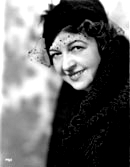
I now live in Doylestown, PA. As a child, I visited my Aunt who had a summer home on bridge five of the canal in Point Pleasant/Smithtown. We dined in restaurants every night, where we would meet all manner of celebrities, my Aunt being a singer with the Metropolitan, Chicago Lyric and San Francisco operas. We went to the playhouse often, then partied with VERY interesting friends afterwards. I recall a gay couple who lived right across the stream from the playhouse. They were very outre and utterly charming lovers of antiques and fun. This would have been, I surmise 1947-1950. The parties were smashing, and as a young boy dreaming of becoming an actor, these times were indelible. We moved back to Bucks, I believe, because of all those remembrances.
At any rate, my Aunt, Kathryn Meisle, later left PA for a summer home in NJ. She retired and turned down many offers for further work. Richard Rogers begged her to do the Mother Abbess in his new musical, "The Sound of Music"; offering to change the key for her later in life vocal range. She later denied this endlessly, but I can spot a bad liar anywhere. She and Rogers remained "Dear, dear friends" throughout both of their lives. Imagine my surprise when she announced she was doing a character role in "On the Town" at the Circus in the late fifties, I believe. When I asked her she said "I just can't turn down Sinjin...no one can!" It was her last public appearance. She died in 1970.
There is another Kathryn Meisle (Tony Award nominee), my daughter and my Aunt's namesake.
P.S. Shouldn't there be a book here somewhere? Those were enchanted times...inhabited by enchanting personalities.
January, 2011
Just found this site while looking up info for my current column re: Sacramento Music Circus....what a memory lane trip !!!!....Fantastic! I was in the chorus....and took over the lead when the star got laryngitis after the first performance...(Denise Lor)....did it for two performances (got some reviews too)...book in hand (no understudies)....standing ovations (in the middle of the show)...it was an unforgettable time and great beginning for my very first show. I'm still smiling after seeing your website....by the way my LA Stage Times editor, Lee Melville, was the stage manager....small world!!!
I was particularly happy to finally get the full name of the actor I remembered only as "Bob" who played Nicky Arnstein. I never forgot him and what he said to me. He was seated watching as I sang "People." I had placed the book down by his side. When I finished the song as I reached for the book, he pulled it away from me. I tried to grab it back begging please I need it. He just smiled, indicated the audience with a nod of his head and said, "Listen to that This happens once in a lifetime. Enjoy it." I looked out and heard the entire house screaming and applauding. I hadn't heard a thing until he said that. Of course, when my mouth dropped open, the audience realized my awe and screamed louder. It seemed to go on forever. He smiled up at me and just glowed. What a kind and generous actor!
Again, thank you for creating this wonderful website.
May, 2021
I just got on your website, it is great, I worked with you in the box office in 1964. It was a great experience that I will never forget. Sinjin wrote a letter of recommendation for me and I ended up at Ringling Bros. Barnum & Bailey circus for 30 years ending as VP of Marketing. It was a great job for a high school kid and learned a lot about theatre management and box office that helped me throughout the years.
Art (Lee) Ricker
January, 2023
In the mid-1960s, as the season was closing, one night at about 10pm, the night watchman spotted an "alien" standing on the hood of the Children's Theatre Progam director, Emily Jefferson's car parked by the box office. After the sighting, he hurried over to the the A-frame office, where we were all working preparing to close the season and take the tent down. We did not believe his story at first, but he said he took a photo. He turned the film over to Gerry Krone, the General Manager. Gerry had it in his briefcase for about 6 months before turning it over to the photo department of Time Magazine. They called him back about 3 days later perplexed by what they had seen. They said it was real or the most elaborate hoax they'd ever seen.
Gerry shared the photo with me and my brother David, who was Press Representative. We were frightened and fascinated by the photo. The alien was about 3 feet tall and in a space suit. Among the pictures, taken with a Brownie camera, was the vague, and I mean vague, outline of a disc shaped craft in the far corner of the box office parking lot. It's an interesting story with many twists and turns, including a report to the federal commission on UFOs, project Bluebook. I don't know if Gerry ever shared this story and the photo with SinJin.
Rick Hesel, Treasurer
They won a national Battle of the Bands competition, played for two full years (1964 and 1965) at The New York World's Fair, had a special day named just for them, were profiled by author James Mitchener for The New York Times and, after their name change to Alexander Rabbit, were asked to perform at Woodstock. They were the finalists from Trenton, New Jersey who won the honor of appearing as the rock band in the Lamberville Music Circus' production of "Bye Bye Birdie."
Source: home.unet.nl/kesteloo/galaxiesiv.html
"After the Ball," Noel Coward's little-known musicalization of Oscar Wilde's "Lady Windermere's Fan, ran a not-so-impressive four months in London. Aside from eight performances opening August 23, 1955 in a summer-stock stint at the Lambertville Music Circus in New Jersey (Directed by Bertram Yarborough), the musical had never been staged in America until Irish Repertory Theatre In New York mounted a production of it from December 16, 2004 to January 30, 2005 to mixed reviews. .
Donald Pippin, Assistant Conductor and Choral Director at the Music Circus in 1955 writes:
"I recall that Noel Coward did attend our performance of "After the Ball." I had met Noel in London and he was so very warm and friendly to me. It raised a lot of eyebrows. Coward's show was quite a difficult event for the music department. We worked from the original London manuscripts. They were a mess. I had forgotten that we ran for a week. I saw the production in NY years later. Believe me, Lambertville was better. We had energy and so excited to do the musical. Our love of the event made it enjoyable."
Sources:
Donald Pippin
www.nj.com/
homepages.gold.ac.uk/
www.nytheatre.com/
